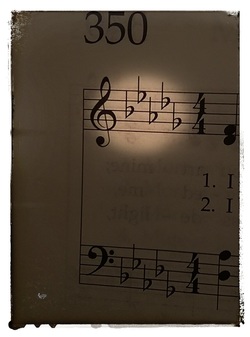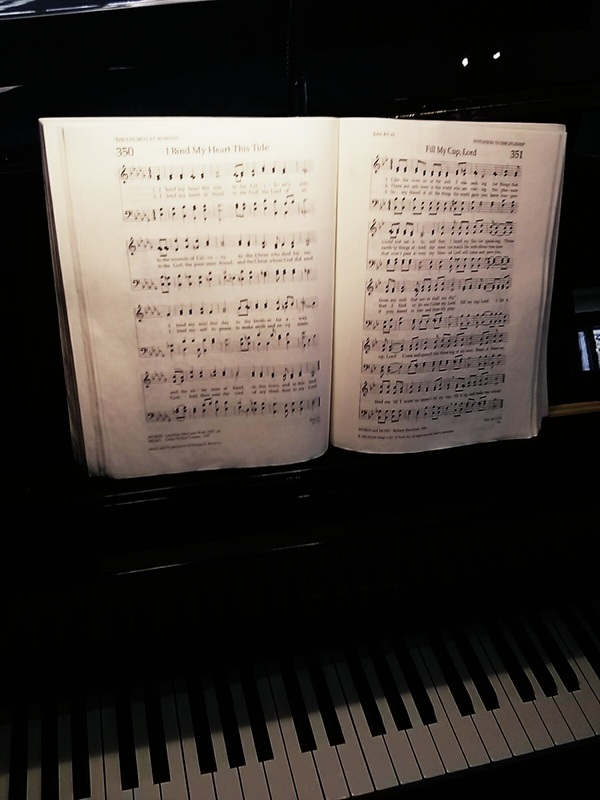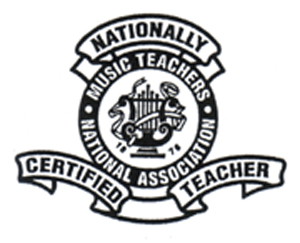 by Audrey Steiner I’ll begin by being blunt: auditioning for college/conservatory is WAY harder than what all your classmates will be going through, complain as they might. You, as a musician, will need to write essays upon essays, obtain recommendation letters, and keep up your grades— just like everyone else applying to college. But on top of that, you will have to prepare one hour of difficult repertoire as well as travel to your auditions. And, once you’ve gotten your acceptance letters, you will not only have to revisit the institutions but also correspond with faculty members to set up trial lessons. You will have to miss quite a bit of school for all of these commitments! If I could change one thing about my application/audition process, I would have began my audition repertoire much earlier. My circumstance was unique in that I had no clue I wanted to pursue music until shortly before my senior year began. So, I needed to learn and memorize a number of brand-new pieces during the fall and winter in order to satisfy audition requirements. This was incredibly stressful, so I would suggest you begin thinking about your college repertoire as early as you can to avoid this stress. That way, you’re performing pieces you feel confident about at your audition without having to worry about learning new pieces. Auditions are generally similar: show up early, get a practice room, freak out more than you should, march out on stage and go for it. I did, however, have a particularly memorable audition experience at the Boston Conservatory that I would like to share. I had been particularly nervous about my Boston Conservatory audition. According to the brochures, the piano professors there were very distinguished performers. I headed to the audition location five minutes before my time slot. A grad student with glasses and brown curly hair stood at a podium outside the double-doors into the audition space. I walked up to him to tell him my name, and he checked me off the list. He looked uncannily like Josh Groban. He tried to help me relax by making small talk and joking around until I was called in. The first thing that happened once I had entered the audition room was that the head piano professor ran through my list of repertoire aloud, double-checking to make sure it was correct. It was. I had double, triple-checked my repertoire list before sending it in, of course: Chopin Scherzo, Bach Prelude and Fugue, Chopin Étude, Ginastera Danzas Argentinas and a Beethoven Sonata, in that order. I had written the Beethoven at the bottom of the list strategically; although I was confident about the first movement, I had barely finished memorizing the second third movements two weeks earlier. “You are performing the Waldstein Sonata, first movement?” The distinguished piano professor asked me with a tilt of his distinguished head. “All movements,” I corrected him. The audition requirement was a “Complete Classical Sonata,” so I don’t know why he assumed that I was playing the first movement only. Unless… did he somehow know that I wasn’t confident about the third movement? But how did he find that out? What if... “Oh, oh. Yes. Of course. My mistake. Please,” he said, interrupting my paranoid thoughts. He gestured grandiosely to the stage and took a seat at the long panel table. He clasped his hands together properly. I ascended the three steps and walked towards center stage. Eight distinguished heads followed my careful approach to the piano. I wondered if they could tell that I had to focus on not tripping on the fabric of the too-long dress pants I was wearing. I sat down in front of the concert grand, the bench squeaking quietly. Natural light shone in through a large window and cradled me in a supportive warmth, telling me, “Hey. This is where you belong: In front of a piano.” Surprisingly enough, the nausea subsided. And I did indeed feel like I belonged right there, in front of that piano. I began with Chopin’s second Scherzo. I lost myself in the piece more than I ever had before. But after a while, I heard a bothersome little noise. Click, click, click. I wasn’t even sure if I was actually hearing a click. What could it have been? Click, click, click. But then, I realized; It was the click of a pen. Just great. One of the judges was a pen clicker. Focus, I told myself. I couldn’t let a small background noise ruin my audition. Clickclickclickclickclickclickclick! The clicking intensified. Was the panel testing me? What was going on? CLICK CLICK CLICK CLICK CLICK CLICK CLICK CLICK!!!!!!!!! Okay, this was starting to get out of hand. Hesitantly, as I continued playing, I turned towards the audition panel. The distinguished piano faculty was standing up, each professor desperately clicking his pen high up in the air in a frenzied manner. “STOP! STOP!” one of them exclaimed. I retracted my hands from the piano and anxiously rubbed them together to keep them warm, hoping I didn’t ruin my chances at being accepted for being so stupid as to not understand the stop signal. Meanwhile, the professors regained their composure. They sat back down, sitting straight-backed, finishing up their notes on my Scherzo performance. “Thank you Audrey,” said the head piano professor as if nothing had happened. “Can we please hear the Bach Fugue?” “Sure,” I chirped, feigning confidence. I sat up in my best, Bach-iest posture and began my Fugue with energy and vigor. I did not hear one pen click from the moment I started through the final chord. My spirits soared as my pinky strummed the final C-sharp; I had played the Bach as close to perfect as I ever had. “Thank you, Audrey,” the professor said after the Bach, his distinguished face stolid. “May we please hear the Waldstein?” “The first movement?” I asked nonchalantly, though every fiber of my being was pleading that they would indeed listen to only the first movement. “Yes, the first movement, I’d say,” the professor confirmed, looking to his colleagues, who all nodded their distinguished heads in agreement. PHEW. The rest of the audition went smoothly. I stopped at every pen click, and I performed every piece with passion and security. When I emerged from the audition room, Groban Grad congratulated me on such a great audition. “You sounded amazing!” he told me enthusiastically. This made me smile big. “Thanks!” I said. But there wasn’t much time for celebration; I had to go to a swim meet! _____ As you can see, my audition experience at BoCo was the most memorable, mostly due to the whole pen-clicking ordeal. And yes, although I missed the stop signal, I did get accepted! I honestly wish I could thank Groban Grad for being so kind to me before the auditions; it really helped. At other schools, the volunteer grad students didn’t do much but take down my name. Once I heard from all of my colleges and conservatories, choosing my next “home” was harder than preparing the auditions! I quickly narrowed my choices down to three schools (Boston Conservatory, Lawrence University and Conservatory, Notre Dame). They are all wonderful places, but they all had their pros and cons. Despite all of the hard work I put into live auditions, I decided to attend the University of Notre Dame (not a conservatory— I simply sent in a number of videos to their music department. No live audition necessary). But that does not mean I’m giving up on a musical career. I believe I can get a great musical education in their small, intimate piano department as I study in their performance-based B.A. program. I’m also looking forward to double-majoring in music and another area I’m interested in! To finish up, I’m giving you two big things that help me when I’m nervous: 1. Chill! I should be the last person telling you that, as I certainly am not the chill-est person. But do your best to have a “whatever” attitude about the prospect of messing up. Even if you go out on stage and fail miserably (you trip as you walk across the stage; as you sit down, your pants rip; you forget all your pieces; you cry visibly and audibly, everyone laughs at you backstage), you’ll be all right. You may never have to see those people again! And no one can take away your love of music. It’s yours and it will always be part of you, no matter how one audition goes. 2. Remember your passion, always! Why do you do what you do? Our love of piano trumps all our insecurities: What will they think of me? Will I mess up? Will I forget? Who cares! Next time you’re scared to play the piano tell yourself that you LOVE piano. You hate NOT playing it. It’s miserable to be near a piano while NOT playing it! Remember that at your auditions!!
2 Comments
Guest blog by Olivia Williams (Piano Prodigies student)
What does the word “nervous” mean to you? Do your thoughts draw a picture of failure? Some might think of green faces expecting to tip over, others might think of restlessness. I get a little nervous, but my piano teacher Miss Elizabeth helps me think of ways to overcome the trepidation of failure and accept the feeling that clouds my stomach. Practicing is a big key to success. Don’t expect the pieces to play by themselves. As musicians, we make sacrifices that some don’t understand in order to keep in touch with our instrument. The piano (or whatever instrument you play) has to become your best friend. Would you want to fight, lose touch, or stay away from that special person? Surely not. Don’t tell yourself it’s impossible—with the right mindset it IS possible. Mental thoughts can jab at your performance, whether they are good or bad. Before a big day, make sure to keep all thoughts and conversations positive. If you make others believe it, it’s much easier to believe. We can admit negativity can do a lot of damage until we are the ones doing it to ourselves. Don’t be shy to yourself -tell yourself that you are going to do well and smile. Earlier today, I competed at the Rockville Competition for Piano and Strings. The judge met me with a smile and I told myself I was going to do well. While sitting on the piano bench, I made sure to take a moment to breathe and even look around (out of my peripheral vision). Glancing at my feet, I felt the floor and I envisioned them reaching into the ground and rooting themselves there. Funny thought perhaps... but it let me know that I wasn’t going anywhere and neither was the piano. We were both stable and I was ready to begin. When I finished my pieces, I felt a pang of sadness that it was over. I realized that I had actually enjoyed the experience. I reflected on how I prepared mentally, and how Miss Elizabeth gave me all of these extremely helpful insights. A week ago, she asked me how I could be thankful for competitions and recitals. Many thoughts ran through my head, because I had not thought of performing in that way. My answer now is I am thankful for the judge’s time, and those who put together performances for students, because some musicians do not get that chance. Each performance is an exciting way to show others how much music means to me. I am thrilled to have been asked to write a guest blog for Your Best Moment - the blog of my friend and fabulous performance coach, Elyssa Smith.
http://www.yourbestmoment.com/blog/mindset-matters-part-i-a-teachers-perspective/ http://www.yourbestmoment.com/blog/mindset-matters-part-2-self-reflections-of-a-performer/ Elyssa's blog has so many helpful ideas (reflections, inspirations, motivations...) for performers . Be sure to read and subscribe!  I was called in to substitute the music director at a local church this morning. My responsibilities included leading the congregation in the hymns throughout the service, and playing music for the prelude, meditation, offertory, communion, and postlude. I dug out some beautiful selections that I thought would be appropriate (shout out to my students Taura and Lukas: I included Valse Melancholique and Prelude from Espana) and arrived early enough to get settled, tag the pages in the hymnal, play through the hymns (once each), and circle the spots in the program that I would be playing. The first service went well.* While playing I thought that this experience would make a great topic to share and demonstrate how many of the skills we develop in lessons are important for situations in which we have limited time to learn new music. A few reminders:
After the conclusion of the service a member of the congregation came over to speak with me, and we quickly lost track of time. Soon, it was 10:45; time to get ready for the 11:00 service. I grabbed a bulletin from the front of the church and let out a little gasp. The hymns for this service were all different than the first service. I would barely have time to tag them, and absolutely no time to play through them. I began the prelude while concocting a plan. As the pastor led the church in prayer between hymns, I would look at the next selection and create a mental map of the hymn. This exercised another, very important skill for pianists:
The final selection was a hymn in D-flat major (5 flats). Oh joy... I appreciated all the folks after both services who came over to tell me how much they loved my performance. I resisted the urge to explain what a relief it was that things went well, but instead made an effort to thank them for having me today and wished them a lovely rest of their weekend. :) *Funny moment: an alarm on my phone (one that I didn't even know that I have!) went off at 8:59am, just as I was finishing the prelude. I finished the piece then dove into my bag to turn it off. I am sure my face turned a nice shade of pink. Great article, featuring my sister's beloved professor at Peabody, cellist Amit Peled.
http://peabodyinstitute.wordpress.com/magazine/vol-8-no-2-spring-2014/the-nature-of-nurture/ “So, how did it go?” Peled queries a student about a recent performance in New York. The student hesitates for a moment and responds, “Well, it was good. My biggest problem is that I get nervous.” Peled waves his hand dismissively. “Look,” he says, “everyone has that fear. You must overcome it. Everyone must. It’s not like practicing at home. The stage is totally different. You must prepare for it. You don’t just go out there. It’s very personal what people do before a concert. But right before you go onstage, you should just play and play and play. Be completely warmed up. That’s what athletes do. They pump up the muscles before a game.” At the end of their hour together, the student places his cello and bow back into a case and informs Peled that he plans to enter a prestigious competition and will try to win. Peled shakes his head. “You don’t want to try. You want to win,” he says. “That’s the right attitude. Don’t do competitions as an exercise or experiment or just to play. That’s a waste of time. You want to win!” Performance psychology is a very interesting field and important topic for performers of all sorts (musicians, athletes, public speakers, etc). There are many approaches to building and maintaining confidence under pressure. Here are a few of my thoughts on preparing for a successful performance:
After your next recital participation, take a moment to write out answers to the following questions:
I would love to discuss your answers with you! |
AboutElizabeth Borowsky is a pianist, teacher, and composer. She is a Nationally Certified Teacher of Music in Piano (Music Teachers National Association). SubscribeCategories
All
Archives
May 2023
|
Location |
|




 RSS Feed
RSS Feed